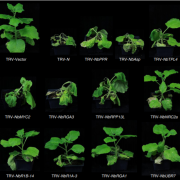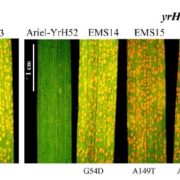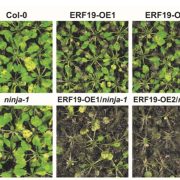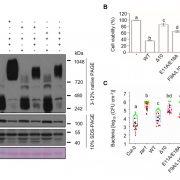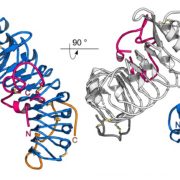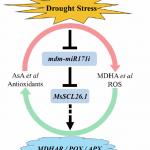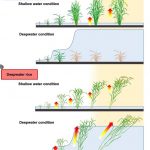Dynamic regulation of Pep-induced immunity through post-translational control of defense transcript splicing (Nature Plants)
 In plant immunity, signal transduction is tightly modulated through mechanisms including controlled stoichiometry of key regulators. Dressano et al. identified the novel IMMUNOREGULATORY RNA-BINDING PROTEIN (IRR) as a negative regulator of immunity in both maize and Arabidopsis through a screen of Plant Elicitor Peptide (Pep)-induced protein phosphorylation changes. Knockout irr mutants exhibit broad changes in defense gene expression and splicing patterns such as retained introns (RI), which often cause premature stop codons. The authors focused on splicing of CALCIUM-DEPENDENT PROTEIN KINASE 28 (CPK28), an important negative regulator of immunity. The retained intron form, CPK28-RI, is truncated and does not function properly in immunity. The phosphorylation status of IRR is crucial for its regulatory role; dephosphorylation of IRR following Pep treatment disrupts its interaction with CPK28 transcripts, resulting in accumulation of CPK28-RI and its truncated protein. IRR dephosphorylation and CPK28-RI splicing are transient, which enables greater defense activation that does not persist, to restore negative regulation of immunity. This research demonstrates a new mechanism linking post-translational modification of IRR to post-transcriptional regulation of CPK28, dynamically amplifying Pep signaling capacity and immune output. (Summary by Katy Dunning @PlantMomKaty) Nature Plants 10.1038/s41477-020-0724-1
In plant immunity, signal transduction is tightly modulated through mechanisms including controlled stoichiometry of key regulators. Dressano et al. identified the novel IMMUNOREGULATORY RNA-BINDING PROTEIN (IRR) as a negative regulator of immunity in both maize and Arabidopsis through a screen of Plant Elicitor Peptide (Pep)-induced protein phosphorylation changes. Knockout irr mutants exhibit broad changes in defense gene expression and splicing patterns such as retained introns (RI), which often cause premature stop codons. The authors focused on splicing of CALCIUM-DEPENDENT PROTEIN KINASE 28 (CPK28), an important negative regulator of immunity. The retained intron form, CPK28-RI, is truncated and does not function properly in immunity. The phosphorylation status of IRR is crucial for its regulatory role; dephosphorylation of IRR following Pep treatment disrupts its interaction with CPK28 transcripts, resulting in accumulation of CPK28-RI and its truncated protein. IRR dephosphorylation and CPK28-RI splicing are transient, which enables greater defense activation that does not persist, to restore negative regulation of immunity. This research demonstrates a new mechanism linking post-translational modification of IRR to post-transcriptional regulation of CPK28, dynamically amplifying Pep signaling capacity and immune output. (Summary by Katy Dunning @PlantMomKaty) Nature Plants 10.1038/s41477-020-0724-1


